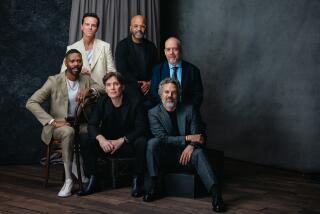Frith gives perfect pitch to EAR
Itâs hard to place Fred Frith, the iconoclastic English-born electric guitarist, anywhere on the musical spectrum -- and thatâs probably the way he likes it.
The California EAR Unit isnât too crazy about boundaries either, and together these sonic explorers drew a substantial, enthusiastic turnout for the EAR Unitâs season-ending concert at LACMAâs Bing Theater on Monday night.
After intermission, Frith sauntered barefoot onto the stage, plugged in and immediately started making some of the weirdest sounds ever heard at Monday Evening Concerts, which have featured more than their share of weird sounds over the decades.
He fiddled with the tuning pegs on his guitar. He stroked the strings with a bow and other alien objects, even his fingers now and then.
He fed some of the results into loops that repeated over and over in sustained rushes of sound (somewhat like Robert Fripp in his Frippertronics mode).
In lesser hands, all of this could have amounted to an avant-garde mishmash, but within minutes, you could feel there was a savvy improvising composer at work, as one section flowed easily into the next.
At all times, the piece teemed with busy life and exuberance, and certain passages even conveyed a strange beauty amid the industrial sonic environment.
The title of the piece was âTrouble With Traffic.â Perfect.
In Frithâs actual encounter with the EAR Unit, â21 Friendly Gestures for 6 Playersâ -- actually seven players, as Frith sheepishly admitted -- it seemed as if the goal were to encourage the musicians to make the zaniest sounds possible for nearly 23 minutes.
Without the controlled sense of structure that Frithâs solo piece demonstrated, a little of this went a long way, but at least he played to the EAR Unitâs sense of fun, ending with a frenetic blast of humor.
Ironically, in light of what was to come, the EAR Unit opened the concert with Ira J. Mowitzâs gorgeous, gentle, instantly appealing âShimmerings,â a new adaptation of his computer piece âShimmeringâ for acoustic instruments and warm electronic tape underpinning.
There were two other pieces on the program. Barbara Monk Feldmanâs âThree Poems by Wallace Stevensâ was immersed in the sparse, quiet, atonal language of her late husband, Morton Feldman -- at some length -- and Tae Hong Parkâs âSingle Unitâ lurched around in jagged fragments until it coalesced into some linear Minimalist patterns.
Neither composition lighted any fires in these ears.
More to Read
The biggest entertainment stories
Get our big stories about Hollywood, film, television, music, arts, culture and more right in your inbox as soon as they publish.
You may occasionally receive promotional content from the Los Angeles Times.










